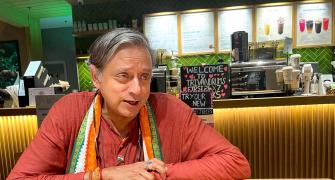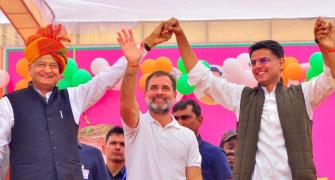A year ago, the Indian National Congress did something unusual, and for it, rare. It proceeded to build a successful broad coalition of secular political parties across the country. This earned it the goodwill of leaders representing currents as diverse as the Left, regional forces, Dalits, and Other Backward Classes -- for the first time ever. That alliance, itself based upon a social coalition of largely subaltern classes, and linguistic and religious minorities, inflicted a surprise defeat on the Bharatiya Janata Party and its allies.
The United Progressive Alliance came to power at the Centre on a pluralist, egalitarian platform, which promised the poor something like a New Deal. The Left lent the UPA explicit support, based on a negotiated National Common Minimum Programme. Even the Samajwadi Party and Bahujan Samaj Party had little choice but to back it.
Today, the broad coalition is under great stress. Such are the growing tensions between the Left and the UPA that CPI General Secretary A B Bardhan has warned of 'bad days ahead' for the Alliance. And CPI-M Politburo member (and likely future general secretary) Prakash Karat now likens the Congress to 'the leopard that won't change its spots.'
In Bihar and Jharkhand, an important UPA constituent, Lalu Prasad's Rashtriya Janata Dal, has drifted away from the Congress and accuses it of splitting the secular vote. The RJD is under frontal attack from another UPA member, Ram Vilas Paswan's Lok Janashakti Party. And the SP and the Congress are at loggerheads in Uttar Pradesh.
What has gone wrong? Is the Congress largely to blame for the present mess, or are its allies culpable? To what extent can the National Democratic Alliance gain from the mess? And can anything be done to clear it?
Simply put, the Congress seems to be in the process of unlearning the rationale of the transition it itself made from Pachmarhi (1998, when it declared that the people want a single-party alternative to messy coalition politics), to Shimla (winter 2003, when it accepted that coalitions are unavoidable and necessary; and that it must become part of one). It has developed delusions of grandeur and a conservative approach to social and economic policies. It is more concerned to assert its pre-eminence, even supremacy, in the UPA and government than to follow the logic of coalition politics which put it in power in May 2004.
Bihar and Jharkhand provide the starkest instance of the Congress' unilateralism and new-found arrogance. In Bihar, the UPA faced its first major test of unity and coherence since the Lok Sabha election. It failed the test not just because Paswan and Lalu fell out, but also because state Congress leaders convinced themselves that their party is once again on the upswing and would exceed its present tally of 12 seats manifold in the coming assembly election. So they demanded about 110 seats from the RJD and the Left (of the state's total of 243). A cynical Congress calculation was that by denying the dominant RJD an outright majority, it would become Bihar's 'kingmaker.'"
When refused more than 30 to 40 seats, the Congress joined hands with Paswan's LJP despite the latter's rejection of an alliance/power-sharing with the RJD. This had the predictable result of confusing the secular-minded voter, especially in the first phase of polling. Unlike in 2004, when secular parties fought together and won almost three-fourths of Bihar's seats, they are competing and raiding one another's bases.
Lalu has formed a bloc with the Left. The LJP has taken him on in all 243 seats. And he has 'friendly fights' with the Congress in 83 seats. Lalu has used relatively restrained language against the Congress, and not once criticised Sonia Gandhi. But the voter cannot get a clear answer to the question: is the Congress a friend or foe of the RJD?
The Congress was so peeved with Lalu in Bihar that it unilaterally allied itself in Jharkhand with the Jharkhand Mukti Morcha to corner together 68 of the state's 87 seats. This is likely to cause the secular alliance some setbacks. Given the intra-JMM split between Shibu Soren and Stephen Marandi, these could prove serious. Ultimately, it's not just the RJD and the JMM that will suffer from the setback. So will the Congress.
The Congress is acting myopically in other states too. Thus in Maharashtra, it insisted on having its nominee made the chief minister although under the agreed formula, the post should have gone to the Nationalist Congress Party. In Andhra, it has ignored the promises made to the Telengana Rashtra Samiti while recruiting it as a major ally for the Lok Sabha election.
In Goa, the UPA-appointed governor displayed partisanship while overturning the patently improper and fraudulent vote organised by the Speaker after wrongly disqualifying one MLA. These were other ways of annulling the fraud and organising a proper vote. But the governor chose the easy option, reinforcing the impression that the Congress is back to its old, manipulative ways. In UP too, it is wantonly trying to topple the Mulayam Singh Yadav government -- although its own base there is too weak to furnish a secular alternative.
Evidently, the Congress forgets the key to the UPA's victory in the Lok Sabha lay in its alliances. As a CSDS-sponsored election study shows, the 'allies brought in fresh support. Coalitions were vital for the victory of the Congress-led alliance in Tamil Nadu, Andhra Pradesh, Bihar and Jharkhand. These seats contributed more than half of the seats that eventually fell in the UPA's kitty.' It is well-known that even a small shift in votes produces a disproportionately large difference in the number of seats won by coalition partners. The Congress would be ill-advised to lose advantage of this formidable aggregating factor by making enemies out of friends.
The party would be even more foolish to push policies and programmes that run counter to the promises it made to the voter in the Lok Sabha election. Its electoral success was attributable to its projection of a programme of social healing, focused on reaffirming secularism, redressing of grievances related to agrarian distress and unrelieved unemployment, and correcting some terrible iniquities and imbalances of the recent past, including stagnation or a fall in social indicators, growing income and regional disparities, and discrimination against the minorities.
It promised to move away from neoliberal 'free-market' agendas to a Left-of-Centre emphasis on improving the lot of the common people (the aam aadmi, who subtly displaced the garib, the poor, in party slogans). Human welfare, not GDP growth or stockmarket indexes, was to be the criterion of relevance and success.
Yet, numerous programmes to achieve this were abandoned -- including rural debt relief and credit provision, doubling the public health budget, reducing regional disparities, empowering the minorities, and guaranteeing the freedom of information. The UPA also diluted compulsory education for all children under 14, and employment guarantee with universal access for all rural households, etc.
Instead, under the P Chidambaram-Montek Singh Ahluwalia dispensation, the UPA's emphasis is on tax breaks for corporations and rich people, schemes to attract foreign investment into telecom and banking, creating further macro-economic distortions, strengthening monopolies through tight patent laws, and on following a WTO-dictated trade regime which is hopelessly biased against Third World interests.
This has increasingly alienated the Left from the UPA -- despite the flexibility the Communist Parties have shown, for instance, in not opposing FDI in aviation and in allowing multinational corporations to set up new wholly-owned subsidiaries without consulting existing joint-venture companies. The government's strategy is not so much to negotiate with the Left parties as to get the corporate media to malign them as some kind of pre-modern or medieval dinosaurs identical to the xenophobic, chauvinist and truly anti-modern Sangh Parivar, which blindly defends domestic monopolies against competition and modernisation, and effectively opposes improvements in productivity.
As argued earlier, the Left sometimes uses conservative-sounding or outmoded language. But it essentially represents modernist and egalitarian politics, committed to justice. These values are firmly rooted in the critical-scientific Enlightenment tradition. The Far Right, especially of the Hindutva variety, loathes the Enlightenment and is deeply uncomfortable with Liberty, Equality and Fraternity.
The Left is articulating demands which closely correspond to what ordinary people want and aspire to.
The people will judge the UPA not by what it does for FDI in banking and reduction of taxes on cars and airconditioners, but what it does to reduce joblessness, and to provide healthcare, education and safe drinking water. If the UPA continues to drift Rightwards, it is liable to be punished as severely by the people as was the NDA.
If the Congress does not want to be complicit in this disastrous process, Sonia Gandhi must intervene and urgently begin course correction. The National Advisory Council, which she heads, has done useful work. What's needed is policy correction at the level of the Congress and the UPA. This brooks no delay.








